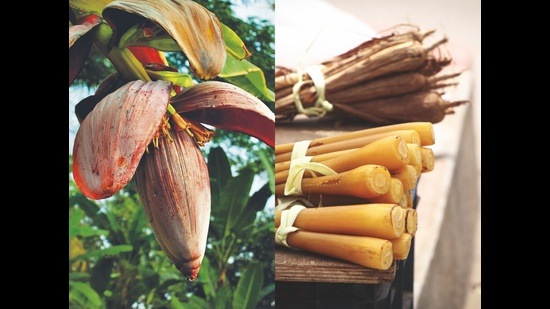Meenakshi Boopathi, 34, a software professional from Tamil Nadu now based in Bengaluru, has been on a mission since 2020. She is championing what she calls “forgotten foods” because she wants people to eat local and eat better, she says.
In order to make it easier for people to do this, Meenakshi also started a Facebook page in January 2020 called Forgotten Foods. Here, she posted recipes and discussed the health benefits of long-forgotten Indian superfoods. So far, so familiar.
This year, she took it a step further. In association with seed-saver NGO Sahaja Samrudha (Kannada for Bountiful Nature), and with funding from Nabard (the National Bank for Agriculture and Rural Development), she brought out a calendar that showcased the forgotten foods of India.
Each page features a small cluster of unusual ingredients, lists their health benefits, and offers at least one traditional recipe. The Forgotten Foods Calendar was launched in English and Kannada in January 2021. Its 25 ingredients are spread across five categories: edible flowers; fruits and seeds; remedial leaves; stems; and roots and tubers. (There are plans for a 2022 calendar too.)
The edible flowers section features butterfly pea, for instance, which can be used as a less-stimulating alternative to caffeine, and has anti-inflammatory and antioxidant properties. These flowers can also be used to prepare blue rice or elsewhere as natural blue food colouring.
In fruits and seeds, there’s black nightshade or manathakkali in Kannada. “This is a wonder shrub that bears tiny fruits containing loads of Vitamin B-complex. It helps cure ulcers and can be stored by sun-drying the small fruit in salted buttermilk,” Meenakshi says.

Across the calendar, similarly, are recipes for a pulao made from banana stem called thor chal; a halwa made from koova or arrowroot. The calendar generated interest all the way in Rajasthan, where NGO Vaagdhara published a Hindi-and-English version in April.
Her back-to-the-roots approach come from her parents, Meenakshi says. “They are very health-conscious. We always ate local. We didn’t eat junk food at all. I ate my first junk food, a burger, when I was in college.”
This gave her an appreciation for the science of her own traditional cuisine. “The traditional diet of Tamil Nadu is very connected to nature. We have a saying, Unavae marunthu, which means food is medicine,” Meenakshi says. “We use ingredients like brahmi [a herb scientifically proven to boost memory and immunity], which people generally don’t eat much because it is bitter. We mix it into daals and it becomes incredibly tasty. This is the kind of information I wanted to share.”
So far, Meenakshi adds, her aim is to send out the information to people who don’t know these superfoods exist, or don’t know what to do with them.
“We are focusing on foods that are not available in supermarkets. My objective is to help people discover wild foods, learn their medicinal properties. The calendar doesn’t offer information on where to get them but a lot of this is now available at online organic stores, organic farms in your neighbourhood or local markets on the edges of big cities,” Meenakshi says. “Or, if one has the space, one can grow them in a garden or on a terrace.”
Stay connected with us on social media platform for instant update click here to join our Twitter, & Facebook
We are now on Telegram. Click here to join our channel (@TechiUpdate) and stay updated with the latest Technology headlines.
For all the latest Art-Culture News Click Here
